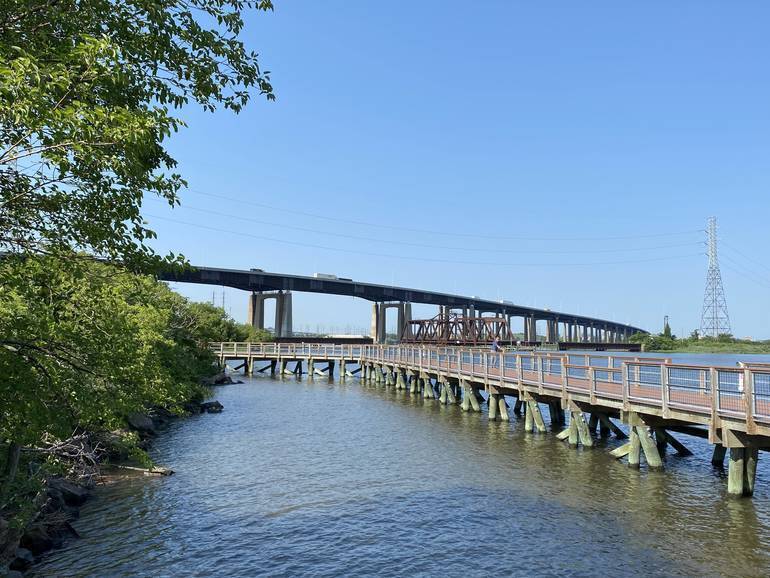BAYONNE, NJ – A $1 million grant from the US Environmental Protection Agency (EPA) Environmental Justice Government-to-Government (EJG2G) program will help fund the multifaceted environmental justice initiative “Clean Hudson,” Hudson County Executive Craig Guy and Congressman Rob Menendez (NJ-D-08) announced on Monday.
Gathered at the Bayonne Public Library, Menendez, Guy and others talked about the impact the program will have on the entire county, noting that there are many more contaminated areas from former industrial sites that county residents must endure as opposed to elsewhere in the state.
“I am incredibly thankful for Congressman Menendez’s advocacy and the Hudson County Division of Planning’s dedicated work to seek this grant opportunity and successfully obtain this funding,” Guy said, adding his thanks to all of the community partners involved in the initiative. “All Hudson County residents have a right to live, learn, work and recreate in a clean and healthy environment, and making Hudson County greener has been a priority for this administration from day one.”
Waterways such as the Hackensack and Passaic Rivers were often dumping grounds for industrial wastes – such as chromium. Agent Orange, a defoliant used to clear jungles during the Vietnam War was routinely discarded into local waterways. The large petroleum producers – although charged with cleaning up some of these sites – have left a legacy of crude oil that bubbles to the surface in residential neighborhoods during flooding.
“With the support of the EPA, we’re taking an all-hands-on-deck approach to protecting our environment and building a green economy in Hudson County,” Menendez said. “By partnering with these extraordinary local organizations, this funding will ensure that everyone in our community benefits from resilient infrastructure and clean public spaces. The Clean Hudson Initiative is a bold step forward for our community, and I know that with continued support from our partners at all levels of government, we will reach our goals.”
The full funding amount will be distributed between Hudson County Division of Planning and the County’s three partners: Hackensack Riverkeeper, Hudson County Improvement Authority (HCIA) and Hudson County Community College (HCCC). Each partner will lead unique projects designed to champion the shared goal of advancing water quality through equitable environmental practices.
“As a lifelong Hudson County resident, I am especially proud that Hackensack Riverkeeper is playing such a major role in this important and timely project,” said Captain Bill Sheehan, Executive Director of Hackensack Riverkeeper. “With this funding, we’ll help thousands of my fellow county residents understand and embrace their ‘watershed citizenship’ – and all the rights and responsibilities that go with it.”
Amanda Nesheiwat, Director of Sustainability and Community Outreach, for the Hudson County Improvement Authority (HCIA) said that the funding will help her organization lead clean-ups and launch a county-wide education campaign.
“Reducing litter is vital for healthier, happier communities,” she said, adding that “Clean streets inspire pride.”
“Hudson County Community College is dedicated to protecting, restoring, and improving our environment,” HCCC President Dr. Christopher Reber reflected, noting that for more than a decade the college’s Phi Theta Kappa Honor Society and other students have assisted the Hackensack Riverkeeper in cleanups. “We are proud to now partner with the County of Hudson and the Riverkeeper in this important initiative by providing training that will lead to credentialing and jobs for our residents, and improved water quality for our area.”
“It is really exciting to see community organizations and state and local governments in New Jersey design creative projects to advance environmental justice,” said EPA Regional Administrator Lisa F. Garcia. “These grant programs will give communities and local governments a new way to approach climate resilience and to develop solutions that can be replicated on other places. EPA continues to engage with and support communities that have traditionally been overburdened by environmental pollution.”



